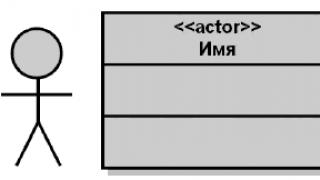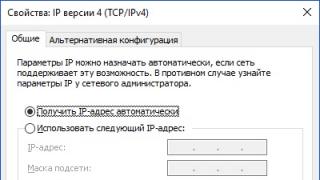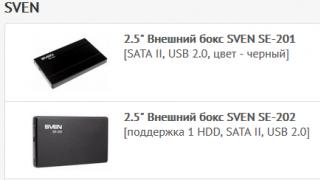Windows Defender is essentially the latest version of Microsoft's free antivirus, first written for . Now it's built right into operating system, which guarantees all computers under Windows control 10 a basic level of antivirus protection.
Is Windows Defender good enough?
Antivirus is enabled by default. Windows Defender automatically scans all running programs, downloads database updates through the Center windows updates (windows update) and has an interface for deep system checks.
But how good is this antivirus? We have to admit: Microsoft development slightly behind competitors in comparative tests antivirus software. We have expressed concern about this before - all the more serious because in the past Microsoft antivirus we really liked it.
Windows Defender has many advantages. It is built-in, does not bother with pop-ups, does not require money and consumes less system resources than some competing antiviruses. It does not attempt to collect data about the user's web surfing and benefit from it, as some free antivirus programs now do.

Overall, Windows Defender provides good protection. If you regularly update Windows (which now happens automatically), use modern browser and avoid potentially dangerous plugins Java type, should be fine. Combined with following the standard security rules that you should adhere to in any case, Windows Defender does its job well.
Despite the low score that Windows Defender received in June 2015 in the test (only "0.5/6" for protection), the program was able to recognize 95% of "widespread and prevailing threats", as well as 85% of zero-day attacks. recognized 100% of test samples in both directions, and recognized 100% of common viruses and 99% of zero-day attacks. So despite the difference in scores, Windows Defender still does pretty well. In the past Microsoft representatives noted that the program focuses on really common threats, while the tests are not representative, and antiviruses from other manufacturers are optimized specifically for passing tests. However, now representatives Microsoft more do not comment on test results.
Windows 10 has other protections that have been carried over from Windows 8, in particular, which prevents malware from downloading and running, regardless of which antivirus is used. And Chrome and Firefox also have Google function Safe Browsing, which blocks the download of many malware.
For most users, Windows Defender will suffice - as long as you have common sense and good security habits. But if you regularly download pirated software and engage in other risky activities, it's better to ditch Windows Defender in favor of some other program that is more effective at dealing with antivirus test samples.

Use MalwareBytes Anti-Exploit
We also recommend using an exploit protection program to protect your browser and plug-ins, which are most often attacked. We recommend free program. It works pretty much the same as her own. Microsoft utility EMET, but more convenient and has more features security. It can block the most common exploits, even previously unknown zero-day attacks. For example, MalwareBytes Anti-Exploit would be able to block all of the zero-day attacks on Flash reported in recent times. The program strengthens the security of the browser, plug-ins and other favorite places of attack by protecting against the most common types of attacks, instead of defending against all known malware samples.
| materials |
Right after Windows installation, Windows Defender is already installed, properly configured, and running. At the same time, as with other antivirus applications, you can manually scan your computer for viruses or, say, temporarily disable your antivirus if it falsely detects secure application as malicious. To manually scan your computer for viruses, follow these steps:
- In the Control Panel, click the Windows Defender icon. The antivirus window will open.
- In the right part of the window, select the scan options by setting the radio button to one of the Quick, Full, or Custom positions. The latter allows you to configure scan settings by selecting the desired objects.
- Click the Check Now button to start scanning.
Note that Windows Defender does its job quite well. But if you want to install an antivirus third party developer then you don't need to worry about disabling it, it will be disabled automatically.
Windows Defender Security Center
It is highly recommended that you do not disable the Security Center. This will significantly increase the vulnerability to external threats and the penetration of malicious programs into the computer.
Safety personal computer, according to most users, is one of the main components of its correct functioning. And it's definitely not worth saving. And with the release of a new version of the operating system from Microsoft this problem has become particularly acute. Antivirus for picking up is not so difficult as it might seem at first glance.
A little about the new version
According to the assurances of the manufacturing company, the final modified version of the operating system was released on July 29th. So, from that moment it became possible update to version 10. However, the operating system was a bit rough at the time. And most importantly - software! And in particular, antivirus for Windows 10 from the eminent Kaspersky laboratory! yes, versions protective program they were simply incompatible with the new operating system. Fortunately for many, this problem was solved by the autumn. As with most other popular software. Therefore, you can now safely upgrade to the new version of Windows, if there is such a desire and opportunity. By the way, the "engine" of the system remained the same as on Windows 8.1, so many software developers did not have to fix their products much, only adjust a little.

Do you really need an antivirus?
Many users are sure that no additional protection a new version does not require an operating system. And all because the standard, built-in antivirus for Windows 10 copes with its main task- protection from external threats. However, everything is not as rosy as it might seem at first glance. Therefore, after some time, many users still wonder if an antivirus is needed on Windows 10. And they come to the conclusion that additional protection hasn't harmed anyone yet.

About Defender
This is what the standard free antivirus for Windows 10 is called. Previously, it was just one of the functions, which later “grew up” to a full-fledged “defender”. In operating system version 8, Defender has already begun its work as an antivirus. In Windows 10, it has undergone some changes, albeit minor ones.
Advantages
The first thing I want to note is the minimum load on the system. Since the free antivirus for Windows 10 is already built into the OS by the developers, the performance of the computer does not decrease in any way. The protection starts background, so no action is required from the user when turning on the PC.
The second, which is also important, is the free basis. Ready and regular antivirus for Windows 10 is built into the system itself, so it is free for OS owners. And it is also updated free of charge. You can configure the update yourself - either manually or automatically if necessary.
The third thing users pay attention to is virus protection. So, for example, when automatic update anti-virus databases are downloaded from the server, which means that they respond in a timely manner to new ones appearing on the Web virus threats. But the product also has disadvantages, and read about it below.
Flaws
It didn't work without them either. So, for example, the rating of antiviruses for Windows 10 indicates that Defender is approximately in the middle of the top of the best defenders. Why? If only because it still does not provide full protection. So, for example, Defender does not intercept infected files when they are downloaded from the Internet if the user himself wishes to perform this operation. And this is a big minus, since a person may not know what exactly he is downloading to his system, not to mention that immediately after downloading the virus can absorb Windows entirely. Leaving no chance for a timely cure. Then the question arises as to what best antivirus for Windows 10. There are several options to consider.

Avast
This is a Czech product that has both paid and free versions. It is worth noting that the developers fussed in time, developing software for the new Windows. And they didn't fail! Those who used Avast updated it on the "top ten", continuing to operate. The program combines both a defender and an anti-spyware. Not to mention that in paid version there is a full-fledged "sandbox" where you can check files and sites for threats. By the way, the program does not load the system at all, although it is a little late at startup. That is, Windows loads faster than antivirus. But with the naked eye, this is not at all noticeable, the program is still included quickly in the process. And that is why Avast can really be considered as the best antivirus for Windows 10. Although it is not the only one, that is why it takes only 2-3 place in the ratings.

Eset Nod 32
For those who wondered if an antivirus is needed on Windows 10, it is worth remembering that additional protection never hurts. And the one that does not load the system, and even works quickly - even more so. And this is where this defender comes into play. This defender not only quickly copes with threats in real time, but also monitors the OS in the background for viruses, spyware and dangerous files. That is why this defender occupies one of the leading places in the top. There are both paid and free versions. The latter are not limited in functionality, like many other similar programs.
Kaspersky
This product is rightfully considered the best in its segment. He doesn't have free versions, exclusively paid. And this suggests that the developers are very careful about their "brainchild". Although a little late with the release of a suitable version for the new operating system. Kaspersky Anti-Virus for Windows 10 did not work any worse because of this. On the contrary, it is noted that the load on the system, which was the sin of previous versions (for 8.1), has become less. So, the performance of the computer has ceased to decline. That is why Kaspersky Antivirus is considered the best defender for Windows 10 today.

Let's summarize
With a rather weak computer hardware, you still should not install an antivirus such as Kaspersky. It is worth paying attention to Avast and Nod 32. Or even use a full-time defender, observing the simplest rules:
- Do not visit suspicious sites (including those for adults, as well as torrents filled with advertisements);
- suspicious files, as well as external media, do not download, but first pass through virtual online "sandboxes";
- do not go through the "left" links, ignoring.
With this attitude to visit " world wide web» The risk of infecting your computer with viruses, worms, and spyware is negligible. And finally, ours for Windows 10:
- "Kaspersky".
- Avast.
- "Nod 32".
Buying one of them or paying attention to any other product is a personal matter for everyone, however, it is these antiviruses that have proven to be the most reliable and efficient, which should also be taken into account when choosing. Enjoy surfing the waves of the global network!
Windows 10 does not pester users with the requirement to install an antivirus, as Windows 7 did. Since the days of Windows 8, the operating system has included a built-in antivirus - Windows Defender ( Windows Defender). But is it really the best - or even usable - solution for protecting your computer?
Windows Defender is essentially the latest version Microsoft Security Essentials, Microsoft's free antivirus, first written for Windows 7. Now built right into the operating system, ensuring all Windows 10 computers have a basic level of antivirus protection.
Is Windows Defender good enough?
Antivirus is enabled by default. Windows Defender automatically scans all running programs, downloads database updates via Windows Update, and has an interface for deep system scans.
But how good is this antivirus? We have to admit: Microsoft's development is a little behind the competition in comparative tests of antivirus software. We've expressed concern about this before, all the more so since we've been very fond of Microsoft's antivirus in the past.
Windows Defender has many advantages. It's built-in, doesn't bother with pop-ups, costs no money, and consumes less system resources than some competing antiviruses. It does not attempt to collect data about the user's web surfing and benefit from it, as some free antivirus programs now do.

Overall, Windows Defender provides good protection. As long as you update Windows regularly (which is now done automatically), use a modern browser, and avoid potentially dangerous plugins like Java, you should be fine. Combined with following the standard security rules that you should adhere to in any case, Windows Defender does its job well.
Despite the low score that Windows Defender received in June 2015 in the AV-Test(total "0.5/6" for protection), the program was able to recognize 95% of "widespread and prevailing threats", as well as 85% of zero-day attacks. BitDefender recognized 100% of test samples in both directions, while Kaspersky recognized 100% of common viruses and 99% of zero-day attacks. So despite the difference in scores, Windows Defender still does pretty well. In the past, Microsoft representatives noted that the program focuses on real common threats, while the tests are unrepresentative, and antiviruses from other manufacturers are optimized for passing the tests. However, now Microsoft representatives no longer comment on the test results.
Windows 10 has other protections that have been carried over from Windows 8, such as the SmartScreen filter, which prevents malware from downloading and running, no matter what antivirus you use. And Chrome and Firefox also have Google Safe Browsing, which blocks many malware from downloading.
For most users, Windows Defender will suffice - as long as you have common sense and good security habits. But if you regularly download pirated software and engage in other risky activities, it's better to ditch Windows Defender in favor of some other program that is more effective at dealing with antivirus test samples.
Use MalwareBytes Anti-Exploit
We also recommend using an exploit protection program to protect your browser and plug-ins, which are most often attacked. We recommend the free MalwareBytes Anti-Exploit software. It works much like Microsoft's own EMET utility, but is more convenient and has more security features. It can block the most common exploits, even previously unknown zero-day attacks. For example, MalwareBytes Anti-Exploit would be able to block all of the flash zero-day attacks that have been reported recently. The program strengthens the security of the browser, plug-ins and other favorite places of attack by protecting against the most common types of attacks, instead of defending against all known malware samples.
Windows Defender combined with MalwareBytes Anti-Exploit is a good, free and simple combination of programs that we recommend to protect the average computer running Windows 10. corporate networks Defender Windows more often all combined with Microsoft EMET, but for the usual home computer Windows Defender plus MalwareBytes Anti-Exploit is a better solution.
(By her own MalwareBytes program- quite decent security solution, serving good addition to any antivirus, including Windows Defender. She finds many "potentially unwanted programs” and other garbage that ordinary antiviruses overlook. But MalwareBytes Anti-Exploit is a separate program.)
Which antivirus is better?
If Windows Defender still does not inspire you, you should look for another antivirus. If you need a paid solution, Kaspersky and BitDefender always get the highest scores in all kinds of antivirus tests. Read reviews or install trial versions and decide which of these antivirus works best. But anyway, Kaspersky and BitDefender are reliable, respected solutions for those willing to shell out.
If you need a free antivirus, Windows Defender is really good. If you definitely want something else, be careful during installation and do not settle for all the browser panels and extensions that the antivirus will try to smuggle with it. Developers free antiviruses have recently been mass distributing their programs bundled with other applications and collecting user data in order to benefit from their "free" solutions.
When you install a third-party antivirus, Windows Defender is automatically disabled and enabled again after other antiviruses are uninstalled. It is specially designed so as not to interfere.
But whichever antivirus you choose, full protection he does not guarantee. If you download and run malicious programs, troubles will start sooner or later anyway.
An antivirus with higher scores in tests for detecting unknown malware, which not everyone else will encounter, of course, can give an additional sense of security, but it is much more important to comply certain rules behavior. It is more useful not to go to dangerous sites and not to drag dubious programs into the system.
And if you consider that the worst threat is zero-day attacks that use holes in browsers and plug-ins or the plug-ins themselves to infect a computer, MalwareBytes Anti-Exploit, perhaps, provides more reliable protection from the most dangerous attacks than any antivirus.



